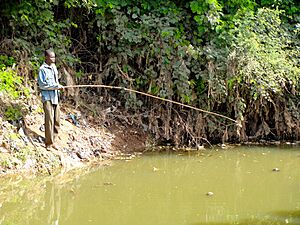Common good (economics) facts for kids
In economics, common goods are a special type of good. They have two main features:
- It's hard to stop people from using them. This is called being non-excludable.
- When one person uses the good, there's less of it for others. This is called being rivalrous.
Think about wild fish in the ocean. It's tough to stop anyone from fishing (non-excludable). But if you catch a fish, that specific fish can't be caught by someone else (rivalrous).
Contents
What Are Common Goods?
Common goods are things that many people can use, but they can also run out if too many people use them without care. They are different from other types of goods because of their unique features. Understanding these features helps us see why common goods need special attention.
What Does "Non-Excludable" Mean?
When something is non-excludable, it means you can't easily stop people from using it. Imagine the air we breathe. It's almost impossible to prevent someone from breathing the air, right? That's what non-excludable means. For common goods, this means anyone can access them, whether they pay for them or not.
What Does "Rivalrous" Mean?
Rivalrous means that if one person uses a good, there's less of it for someone else. Think about a slice of pizza. If you eat a slice, your friend can't eat that same slice. It's gone! For common goods, this is important because it means the resource can be used up or become less useful if too many people use it at once.
Examples of Common Goods
There are many examples of common goods all around us. They often involve natural resources or shared spaces.
Fishing in the Ocean
As mentioned, wild fish in the ocean are a classic example. Anyone with a boat and fishing gear can try to catch fish. It's hard to stop them. But every fish caught means one less fish for other fishers or for the fish population to grow. If too many fish are caught, the fish stock can shrink, making it harder for everyone to find fish in the future.
Public Parks and Forests
Many public parks and forests can also be common goods. Most people can enter and enjoy them without paying a fee. However, if too many people visit a park, it can become crowded. The trails might get worn down, or the natural beauty could be damaged. In this way, one person's enjoyment can reduce the quality of the park for others.
Clean Air and Water
Clean air and water are also common goods. Everyone needs to breathe clean air and drink clean water. It's hard to stop people from using these resources. But pollution from factories or cars can make the air dirty for everyone. Similarly, if a river gets polluted, it affects everyone who relies on that water.
Why Are Common Goods Important?
Common goods are important because they are often vital for our lives and the environment. However, because they are non-excludable and rivalrous, they face a unique challenge.
The "Tragedy of the Commons"
When common goods are not managed well, they can suffer from something called the "tragedy of the commons." This happens when many individuals act in their own self-interest, using a shared resource without thinking about the long-term effects on others or the resource itself. For example, if every fisher tries to catch as many fish as possible, the fish population might crash, harming everyone in the long run. This "tragedy" shows why it's so important to find ways to protect and manage common goods.
How Do We Manage Common Goods?
Managing common goods is a big challenge for communities and governments. To prevent them from being overused or destroyed, people often come up with rules or systems. This might include:
- Regulations: Setting limits on how much of a resource can be used, like fishing quotas or hunting seasons.
- Permits: Requiring people to get a permit to use a resource, which can help track usage.
- Community Agreements: Local communities working together to decide how to share and protect a resource.
- Conservation Efforts: Investing in projects that help restore or protect the resource, like planting trees in a forest or cleaning up a river.
By working together, we can make sure that common goods are available for everyone, both now and in the future.
See also
 In Spanish: Bien común (economía) para niños
In Spanish: Bien común (economía) para niños
 | James B. Knighten |
 | Azellia White |
 | Willa Brown |


